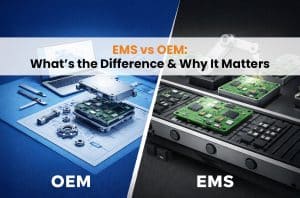In the fight against climate change, electric vehicles (EVs) have emerged as key players in reducing greenhouse gas emissions and promoting sustainable transportation. Their environmental benefits are well-documented, but an often-overlooked aspect is how electronics manufacturing services (EMS) contribute to the green credentials of EVs. This blog delves into the environmental advantages of EVs and explores the role of EMS companies, including their PCB assembly services, in enhancing these benefits.
The Environmental Impact of Traditional Vehicles
Traditional internal combustion engine (ICE) vehicles are significant contributors to air pollution and climate change. They emit carbon dioxide (CO2), nitrogen oxides (NOx), particulate matter (PM), and other pollutants that have severe health and environmental impacts. The transportation sector alone is responsible for nearly 15% of global greenhouse gas emissions, making the shift to cleaner alternatives imperative.
Electric Vehicles: A Cleaner Alternative
Reduction in Greenhouse Gas Emissions
EVs produce zero tailpipe emissions, which means they do not emit CO2 or other harmful pollutants during operation. When powered by renewable energy sources, the lifecycle emissions of EVs are significantly lower than those of ICE vehicles. Even when charged with electricity from the current energy mix, which includes fossil fuels, EVs still offer a net reduction in emissions due to their higher efficiency.
Improved Air Quality
In urban areas, where air quality is a major concern, the adoption of EVs can lead to substantial improvements. The absence of exhaust emissions from EVs reduces the concentration of NOx and PM in the air, leading to lower incidences of respiratory diseases and other health problems associated with poor air quality.
Noise Pollution Reduction
EVs operate much more quietly than ICE vehicles, leading to reduced noise pollution. This benefit is particularly significant in densely populated urban areas where noise pollution is a persistent problem.
The Role of Electronics Manufacturing Services in Enhancing EV Benefits
Electronics manufacturing services (EMS) play a crucial role in the production and advancement of EV technology. These services encompass the design, manufacture, test, and distribution of electronic components and assemblies. Here’s how EMS companies contribute to the environmental benefits of EVs:
Efficient Production Processes
EMS providers leverage advanced manufacturing technologies and methodologies to produce EV components efficiently. Techniques such as automated assembly lines, precision manufacturing, and quality control ensure that components are produced with minimal waste and energy consumption. This efficiency reduces the overall environmental footprint of EV manufacturing. By incorporating efficient PCB assembly services, EMS companies further streamline the production process, enhancing the sustainability of EV manufacturing.
Sustainable Materials and Practices
Leading EMS companies are increasingly adopting sustainable practices and materials. For example, they are using recycled and bio-based materials in the production of electronic components. Additionally, many EMS providers have implemented stringent waste management and recycling programs, ensuring that electronic waste is minimized and properly handled. PCB assembly services, when integrated with sustainable practices, contribute to a reduced environmental impact by optimizing resource use and waste management.
Innovation and R&D
EMS companies are at the forefront of innovation in EV technology. They invest heavily in research and development to create more efficient and sustainable electronic components. Advances in battery technology, power electronics, and energy management systems are often driven by EMS providers. These innovations lead to EVs that are more energy-efficient, have longer ranges, and are cheaper to produce, making them more accessible to consumers and further driving the shift away from ICE vehicles. By focusing on PCB assembly services, EMS companies ensure that the essential circuitry of EVs is both high-quality and environmentally friendly.
Life Cycle Management
The EMS industry is also focused on the entire lifecycle of EV components, from design and production to end-of-life management. By designing components for easier disassembly and recycling, EMS providers ensure that the environmental impact of EVs is minimized even at the end of their useful life. This holistic approach, which includes efficient PCB assembly services, contributes to the sustainability of the entire EV ecosystem.
The Synergy Between EVs and EMS Companies for a Greener Future
The relationship between EVs and EMS companies is symbiotic. The growing demand for EVs drives innovation and efficiency in the EMS industry, while advancements in electronic manufacturing directly enhance the performance and environmental benefits of EVs. This synergy is essential for accelerating the transition to a sustainable transportation future.
Government Policies and Support
Governments worldwide are recognizing the importance of this synergy and are implementing policies to support both the EV and EMS industries. Subsidies for EV purchases, investments in charging infrastructure, and incentives for sustainable manufacturing practices are helping to create a favorable environment for the growth of these sectors.
Consumer Awareness and Demand
As consumers become more aware of the environmental impact of their choices, the demand for EVs and sustainably produced electronics is increasing. This shift in consumer behavior is driving manufacturers to adopt greener practices and produce more environmentally friendly products. The emphasis on PCB assembly services within EMS companies ensures that the growing demand for EVs is met with high-quality, sustainable components.
Conclusion
The environmental benefits of electric vehicles are undeniable, from reducing greenhouse gas emissions and improving air quality to lowering noise pollution. The role of electronics manufacturing services in enhancing these benefits is equally important. By adopting efficient production processes, sustainable materials, and innovative technologies, EMS companies are crucial in making EVs more sustainable and accessible.
As we move towards a greener future, the collaboration between the EV and EMS industries will be vital. Continued innovation and sustainable practices in electronic manufacturing, including efficient PCB assembly services, will ensure that electric vehicles can deliver on their promise of a cleaner, healthier, and more sustainable world.


